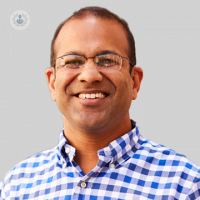Surviving pancreatic cancer
Escrito por:Symptoms of the most common form of pancreatic cancer are usually non-specific. Often a person starts to experience mid-back pain, which may or may not be associated with upper tummy pain that doesn’t go away with simple painkillers.
The pain may require repeated medical attention from a general practitioner or over-the-counter medication for a prolonged period of time; months to a couple of years. A feeling of heartburn may also bother the affected person for a long period, requiring repeated medical attention. Professor Hemant Kocher talks to us about spotting the signs, screening and survival rates of pancreatic cancer.

What are the symptoms of pancreatic cancer?
Along with mid back pain, tummy pain and heartburn, symptoms can also include the following:
- Jaundice: yellowing of the skin and eyes, this occurs when the bile duct gets blocked as a result of pancreatic cancer
- Dark urine and pale stools
- Itching
- Weight loss
- Loss of appetite
These symptoms are not specific to pancreatic cancer. Therefore, if suspected, urgent medical tests, usually in the form of scans such as CT scans are required.
Rarer forms of pancreatic cancer arise from the endocrine part of the pancreas. The endocrine tumours present with symptoms of excess hormone secretion of a particular type. This leads to either low blood sugar, which can result in fainting episodes or high blood sugar leading to diabetic symptoms such as increased urination, thirst and hunger.
Overall, there are very little symptoms which are specific to pancreatic cancer. If suspected, detailed scans are required such as a CT scan or an MRI scan.
What is the cause of pancreatic cancer?
It’s not known what environmental influence causes most instances of pancreatic cancer. About 5-10% of pancreatic cancers are caused by an inherited genetic condition. It’s estimated that 50% of those diagnosed already have diabetes. Scientific advances have identified a number of possible genetic mutations present in pancreatic cancer cells, some of which are common across many cancers. Further studies of these genetic changes may identify the cause of pancreatic cancer.
What are the risk factors?
Most pancreatic cancers occur after the age of 60, so age is an obvious risk factor.
Smoking also increases the chance of pancreatic cancer. Other risk factors such as alcohol, coffee consumption, red meat consumption and industrial exposure to toxins are associated with increased risk.
There is some evidence that factors such as sunlight, plant-based diets or vitamin consumption may also increase the risk, but there isn’t sufficient evidence to prove this.
What are the different types of pancreatic cancer?
There are many types of pancreatic cancer. The most common type (85-90% of cases) is pancreatic ductal adenocarcinoma, which is sometimes incorrectly used interchangeably with pancreatic cancer.
The second most common type is neuroendocrine tumours of the pancreas (5-10% of cases). Other rarer forms of pancreatic cancer are infrequently seen.
At what age should I be screened for pancreatic cancer?
There are no national or international guidelines for the screening of pancreatic cancer. If a family has three or more relatives with pancreatic cancer or different types of cancer run in the family, family members should be referred for genetic counselling.
Upon counselling, high-risk individuals may be enrolled in a research study investigating the utility of a screening programme which would encompass blood tests and scans.
What is the survival rate for pancreatic cancer?
Current statistics suggest that the overall survival rate for pancreatic cancer is poor. There are around 9,800 new pancreatic cancer cases in the UK every year, that's 27 every day. There are around 9,000 pancreatic cancer deaths in the UK every year, that's 25 every day. Sadly this means that less than 5 in 100 (3%) of people diagnosed with pancreatic cancer in England and Wales survive the disease for five years or more. Also, only around a fifth (21%) of people diagnosed with pancreatic cancer in England and Wales survive the disease for one year or more.
Treating pancreatic cancer includes surgery and chemotherapy. If both treatments are possible and are carried out perfectly, by experts and tolerated fully by the patient, the survival rate might reach 50% at five years. Hence early diagnosis and expert treatment with a multi-disciplinary team are vital for pancreatic cancer patients to survive long term.
If you or someone you know has been recently diagnosed with pancreatic cancer or would like to see a specialist to know more about this condition, visit Hemant Kocher’s profile.


